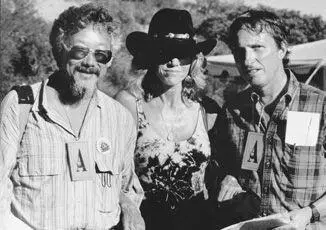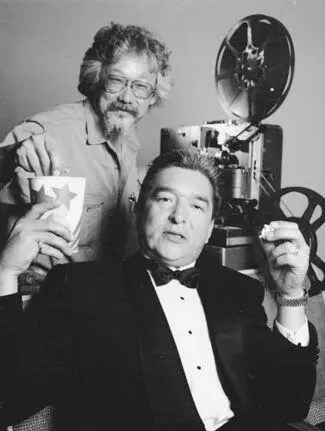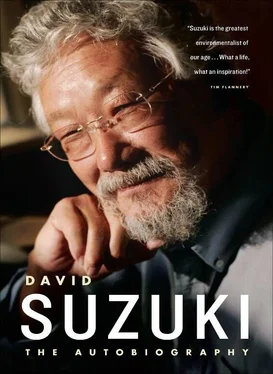
With Jane Fonda and Tom Lovejoy at a conference in Malibu, California
SOME “CELEBRITIES” DO DESERVE attention. Noam Chomsky is an academic I admire enormously. As a linguist, he is widely respected by academics for his idea that language and syntax are built into the human brain by heredity. His celebrity status, however, rests on his role as an outspoken critic of American foreign policy.
He has near cult status in Canada, where each of his books rockets to the top of best-seller lists, and he has gained a wide audience through the National Film Board documentary Manufacturing Consent . His forays into Canada are met with a rapturous response from his fans, a striking contrast to the reaction in his own country, where he is reviled as a traitor by large segments of American society. When Tara was teaching at Harvard, she saw an announcement that Chomsky was speaking on campus, so she went to the hall early to get a seat. To her surprise, there was no one else there, and by the time Chomsky spoke, there may have been thirty students in the room. He has a large following in Europe, Australia, and Latin America, where his left-leaning analyses strike a chord with activists.
I first met Noam Chomsky in the early '90s, when he was in Toronto to speak at Ryerson Institute of Technology. At that time, the CBC offices I worked in were at the corner of Bay and College, only a few blocks from Ryerson, so I dropped in to see whether I might meet him. It was a few hours before his talk, and he was in an auditorium checking the audiovisual system with a few students. To my delight, he greeted me warmly, informing me that Canadians regularly sent him my newspaper columns, and he complimented me on what I was writing. He is a superstar, and it was flattering to be acknowledged so generously.
For years after I began to speak out about environmental issues, as I said earlier, I felt as Chomsky does — that it was not up to me to tell people what to do or where the solutions were; I was simply a messenger trying to catalyze public concern. But I have read many books and articles, met many people, acquired information and knowledge, and reflected a lot about issues, all of which has shaped the way I see the problems. It has become clear to me over the years that it would be very difficult and time-consuming for people who are starting to get involved to wade through the same volume of material in a short period. And if the issues are urgent, then those of us who are pressing those issues have a responsibility at the very least to help people avoid unnecessary material or sources and get up to speed faster, still on their own but with some shortcuts to assist them. Chomsky refused to give any tips or recommendations when asked.
American consumer advocate and reformer Ralph Nader once spoke in Vancouver in the same week that Chomsky lectured at the city's Queen Elizabeth Theatre. It was almost too much to have two such prominent figures on hand at the same time. Nader's performance two nights later was a huge contrast to Chomsky's presentation. Nader had been invited by nurses who were involved in a dispute with the government. Instead of the grand surroundings of the Queen Elizabeth Theatre, his event was in a movie house in a rougher part of downtown Vancouver. It too was packed, and Nader gave a stirring speech in which he praised Canadians for our leadership in social issues (with Duff Conacher he had written a best-selling book about Canadian firsts) and compared Canadian social values with those of the United States. He received a standing ovation. Unlike Chomsky, when he was asked what could be done, Nader immediately listed off people, organizations, and strategies that could be contacted and worked with.
Nader has spent his career motivating people to take action, setting up public-interest research groups in universities across Canada. But it's a lonely life. From his earliest venture as a consumer advocate against the automobile industry, the lawyer has been subjected to intense scrutiny for any signs of vulnerability. I had met Nader while I was in Washington to film for The Nature of Things ; I decided to drop in and meet him as a hero of mine. He greeted me warmly and was clearly informed about issues in Canada. His office was cluttered, books and articles heaped in piles. As we strolled through the room, he loaded me up with books, pamphlets, and articles. He really believes in empowering people with information.
Before he arrived in Vancouver for his speech, his office had called and said he would like to have dinner with me. When I asked what kind of food he liked, I was told he had no great preference but that since he is of Lebanese origin, Middle Eastern would be good. So Lebanese it was. Tara and Severn went along with me, and Ralph was accompanied by an associate and a nephew who lived in Vancouver. It was a lively and stimulating evening with lots of animated discussion.

Famed First Nations actor Graham Greene in a gag shot
Ralph is a very serious and intense person. This became obvious when a belly dancer appeared and began clicking her castanets, throwing her scarf around the necks of diners, and pulling them to their feet or their heads to her bosom. My jaw dropped as I watched. Ralph didn't even look her way and kept on talking. Finally she came over to our table, enticing a couple of people to get up to wiggle for a few seconds on the floor before stuffing some bills into her bra. Ralph never looked up but kept right on talking. The dancer eventually left without ever engaging him.
At the end of the meal, as we got up to leave, Ralph made no mention of the belly dancer but simply said: “That was a very nice meal. And no one overate.”
WHEN I TAKE A trip — and especially before I used e-mail — faxes and mail pile up very quickly. So I have the mail separated into folders marked Urgent, Speaking Requests, First Class, Second Class, and Bumf. This system provides me with a way of responding first to the most pressing messages and working toward material to glance at and then file or discard.
In 1990, I arrived home from a couple of weeks away to find a stack of mail that Shirley Macaulay, my secretary, had left on my porch at home. Even though it was quite late at night and I was tired, I couldn't resist taking the top two folders, which were quite thick, to bed, and I began to sift through them. Shirley usually flagged with a little tab letters she thought were especially urgent, interesting, or important.
When I got to a handwritten letter of several pages with no tab, I figured it would be a struggle, because handwritten notes are so much harder to read and this was a long one. But the script was beautiful and easily read, so I started and was soon drawn into the content, which was the writer's response to a speech I had given a few months earlier. When I got to the thirteenth and last page, it was signed “Charles.” I thought, “Charles who?” I looked back at the letterhead on the front page, and it said Windsor Castle. It was from Prince Charles! I thought it must be an elaborate joke, but it wasn't. I've never discussed this letter in public before. It was the real thing, and this is how it came to be.
In January 1990, I gave a speech to the Food Marketing Institute in Honolulu, and apparently a transcript of my remarks was sent to Prince Charles. Not only did he read it, he sent me a detailed response in the handwritten letter. Unfortunately, when I asked his office for permission to reprint the letter, I was refused permission to quote even a sentence. But I can give the gist of what he said.
Читать дальше




![David Jagusson - Devot & Anal [Hardcore BDSM]](/books/485905/david-jagusson-devot-anal-hardcore-bdsm-thumb.webp)









